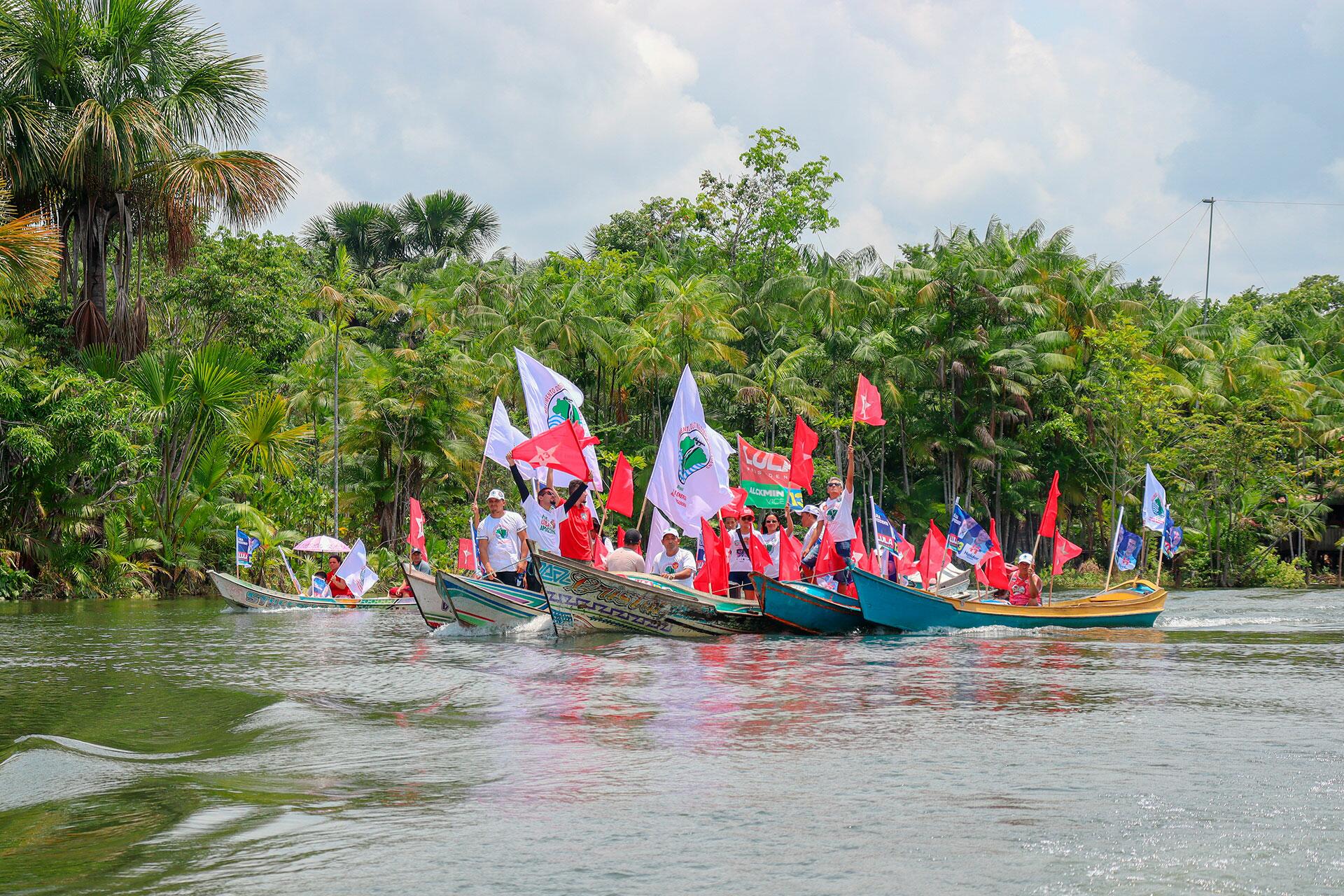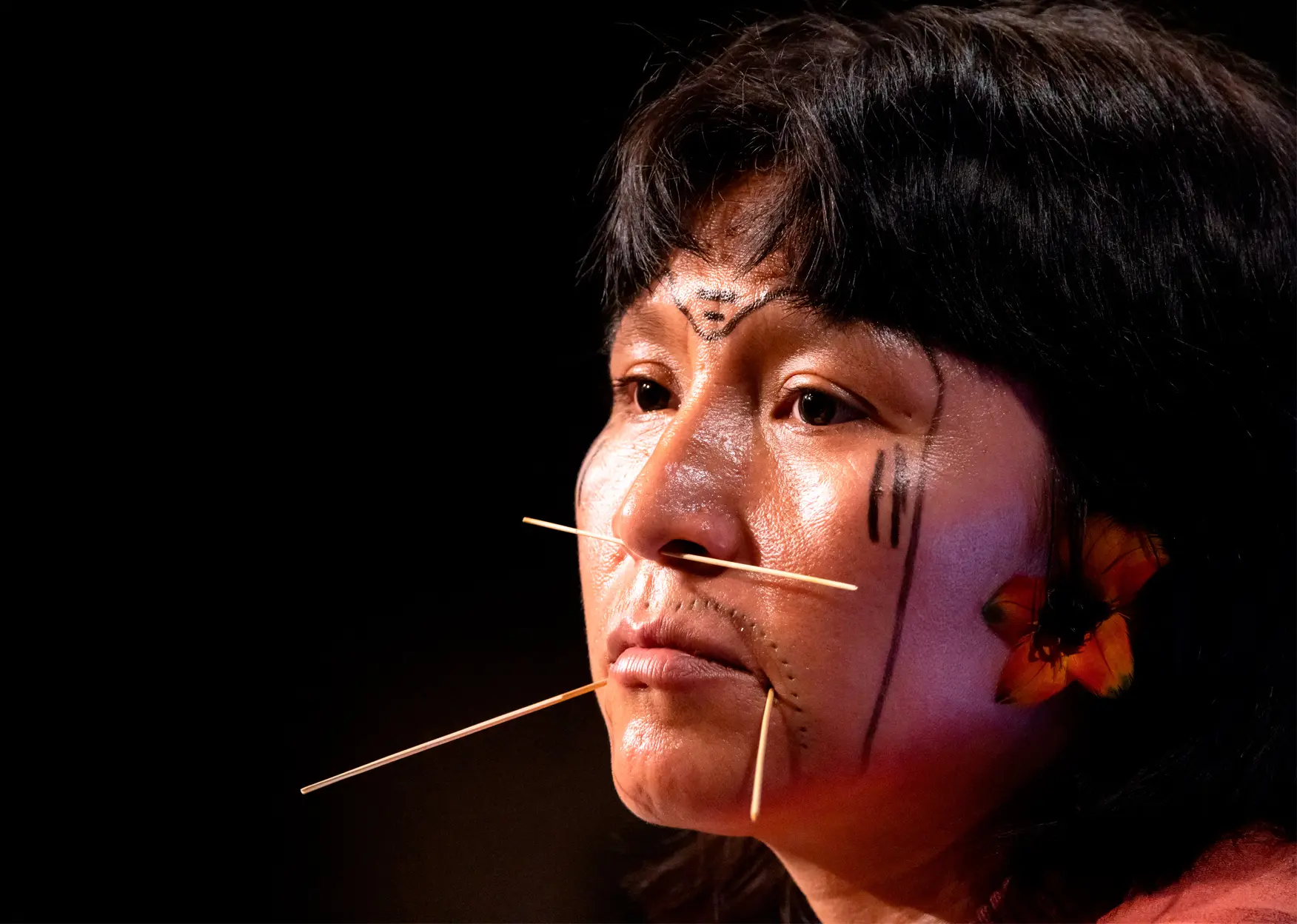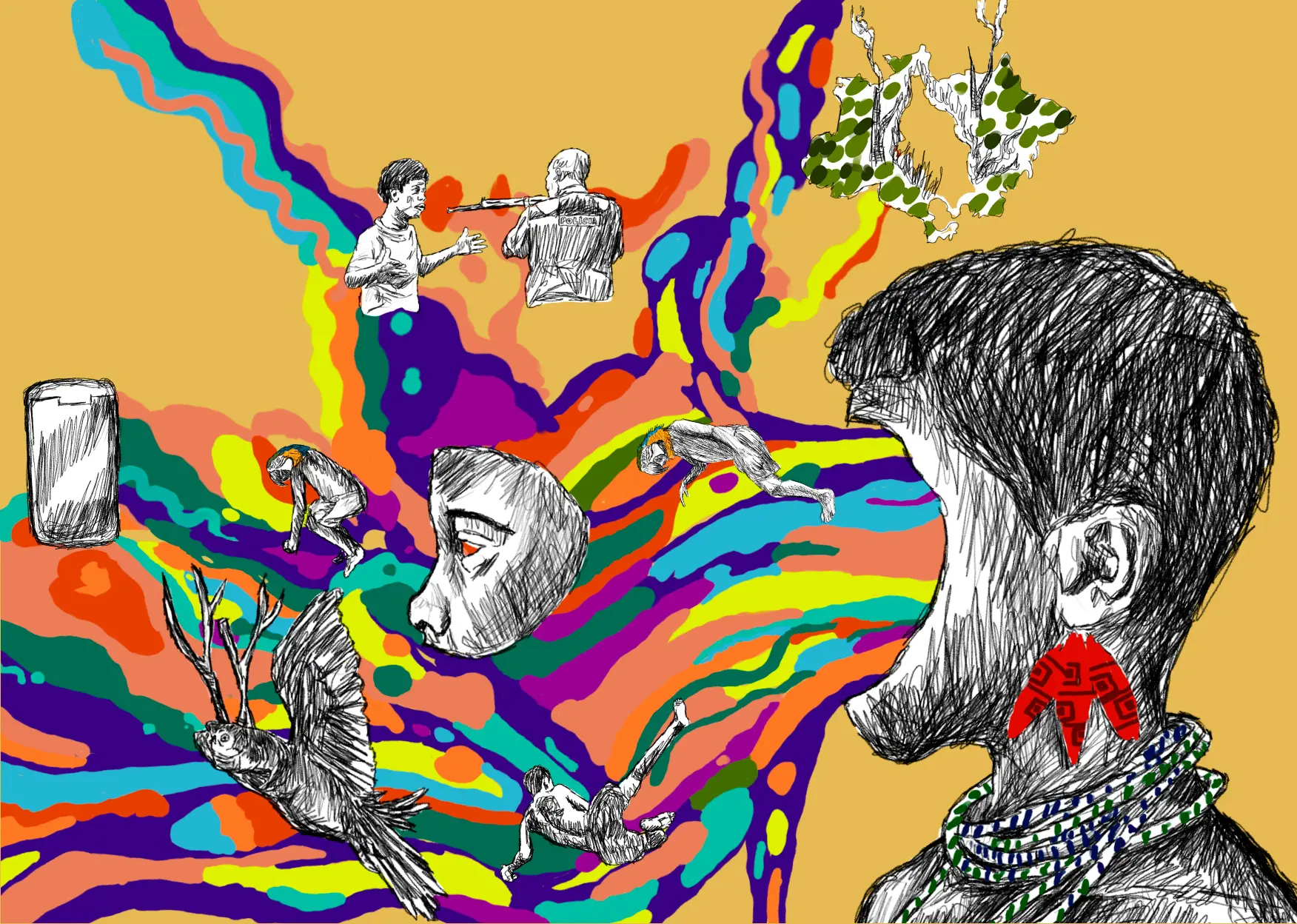Bolsonarism feeds on fear. It wants us to stay at home, as if the country were already in a state of exception. That is why we need to occupy every space and take a stand. In my family, we decided to take a shared approach to the struggle: I left my home town, Altamira, in the so-called Arc of Deforestation in the State of Pará, to fight against the intimidation and campaign of disinformation of Jair Bolsonaro and his supporters in the state capital, Belém, which accounts for 30% of the state’s electorate. My companion and my daughter stayed at home on the outskirts of the municipality of Altamira. In this way, we took up the struggle on two fronts, like a lot of social movement activists throughout the entire Amazon region.
Those of us from the Movement of Dam-Affected People (MAB), have aligned with the Lula for President Agitation and Propaganda Brigade, together with other urban and rural organizations, not just in the Amazon region, but in all parts of the country. The brigades are organized into groups of five to ten militants and prioritize street campaigning and talking with voters about economic issues, such as the increase in food, gasoline and electricity prices. The instruments that we use are pamphlets, posters, flags, songs, and a lot of talking. There is no ready-made formula, but I will tell you four tactics that we use to confront forces much larger than us, given that Bolsonaro uses his position as president and the machinery of state in his campaign.
Tactic 1: Fight the lies with a focus on those who are undecided voters
As the polls and everyday experience show, evangelicals are among the most passionate supporters of the right-wing extremist who is seeking re-election. We focus on this group of voters. But it is not easy. Naelson Pantoja, 33, coordinates one of the campaign brigades in Belém. He is also a youth leader in the Torrente do Norte evangelical community, and most of those who he has brought with him to join the campaign belong to the church. According to Naelson, about 50 young people, mainly from the outlying districts of Guamá and Terra Firme, are taking part in the pro-Lula campaign for the votes of those who are undecided. But the church, which is located in the Guamá neighborhood, lost 60 out of about 350 members when the pastor decided to publicly take a stance against Bolsonaro.
Naelson says that the arguments that drive this electorate are mainly the so-called moral and family defense agendas. Social and economic agendas are not of much importance to them. The lies that stir up emotions, linking the left wing to a threat to the family and the church, find fertile ground. Stories that seem easy enough to dispute – such as saying Lula will close churches and impose unisex bathrooms in schools – have been doing the rounds for a long time /among this group without any response. Now it is up to us to take these lies apart, using reasoning and the content available on cellphones as our weapons.
We know people who are die-hard Bolsonaro supporters will not change their minds. It is not worth the time it takes, unless they are together with an “audience” of people who are undecided, to be won over. Our efforts are focused on convincing those who have not made their minds up or who voted for Bolsonaro because of the influence of friends and family, rather than because they identify with the government’s program.
There are some moments when the Bolsonaro campaign lets the mask slip, providing us with ammunition for our fight. For example, last week, the Minister for Economic Affairs, Paulo Guedes announced that he intends to change the rule for readjusting the minimum wage and social security benefits, decoupling them from inflation. What this means in practice is a reduction in these benefits. This announcement did so much damage that Bolsonaro rushed to say that “it is not really like that”. At the same time, we hurried to publicize the issue as much as possible on social media, over the loudspeakers, in street mobilizations and in face-to-face conversations.
However, it needs to be recognized this is not an election that is based solely on lies. Bolsonaro has a social support base connected to the conservative values that he represents, which is very committed and fueled by a powerful communication network that reaches its audience without relying on the press. Just a few minutes after the end of the first debate between the candidates, on October 16th, a number of videos of the president’s best moments had already made it onto the WhatsApp groups in my neighborhood, in the outskirts of Altamira. These groups are real social connection spaces, where neighbors swap information about the times that the garbage trucks come round, water shortages, purchases and sales. Every time we post something in favor of Lula it is countered by an avalanche of videos, memes, stickers, and fake news from Bolsonaro’s most fanatical supporters.
Tactic 2: We need everyone
There is no way to deny that Bolsonarism came out of the first round of the elections politically stronger, with the election of a number of senators and congressmen linked to the extreme right and drumming up the support of governors of the country’s largest electoral districts. However, in the State of Pará, Governor Helder Barbalho (MDB) was reelected with 70.41% of the votes, which was the highest vote in the country, defeating Bolsonaro’s candidate Zequinha Marinho (PL), who is a spokesperson for landowners, loggers, and miners. In the second round, Barbalho decided to publicly support Lula. As a result, the red that is traditional among the Workers Party began to share space with the blue that is used by the governor for the color of all the materials, from flags to stickers.
The State of Pará is a snapshot of a very serious moment in Brazil. Barbalho is the heir of one of the Amazon region’s main political oligarchies. As governor, he champions projects that have a huge socio-environmental impact, like that of the Canadian mining company Belo Sun, in the Volta Grande do Xingu. But today we are allied with him in order to defeat Bolsonaro and his support base in the Amazon region, which is a much worse set of enemies. Similarly, in Altamira, Lula’s campaign is being coordinated by a coalition made up of a set of organizations that, for the most part, fought against the disastrous Belo Monte hydroelectric dam, which was planned and auctioned off during Lula’s government and built by his successor, Dilma Rousseff. That may seem like a contradiction only until we stop and realize who Bolsonaro’s supporters are in this region: land-grabbers, loggers, and businessmen who have their origins in criminal activities that have a massive negative impact on the forest.
Although Lula won in Pará, those areas dominated by predatory agribusiness gave the current president a significant advantage: this is the case in the municipalities along the Transamazon highway, such as Altamira, where Bolsonaro obtained 57.77% of the votes. In other places, where the population is more concentrated on the riverbanks, such as the municipalities of Baixo Tocantins and Marajó, Lula won by a large margin. “In the outlying districts, where the ordinary people are, as well as in the rural and riverside areas, the campaign is going down well. It is in the commercial center, in the wealthier areas, that Bolsonaro has the upper hand,” says Edizângela Barros, 37, an activist from the Women Workers Movement of Altamira Country and Town).

Ribeirinhos fazem “barqueata” pelo rio Tocantins, nas proximidades da comunidade de Mapiraí de Baixo, município de Cametá, Pará (21/10/2022). Foto: Amanda Paulino/Coletivo de Comunicação do MAB.
Tactic 3: Encourage those who already vote for Lula to turn up
A woman who is distributing promotional flyers in front of a store in the city of Belém’s commercial center tells me she is going to vote for Lula and asks for my help with points to discuss with her acquaintances. I hand her a pamphlet produced by the brigades that compares the economic policies of Lula’s government with those of Bolsonaro, highlighting the increase in the prices of food, oil-based products and electricity under the current government. The main slogan: “It’s expensive, it’s Bolsonaro’s fault!”
She quickly relates the subject to her daily life and confesses she would probably have skipped lunch that day, because she didn’t have enough money to eat in the street. In Pará, more than half of the population (52.4%) is moderately-to-severely food insecure, according to a study carried out by the Brazilian Research Network on Food and Nutritional Sovereignty and Security. The rate is high even for the northern region, which is one of the worst affected areas in Brazil, with 45.2% of the population being food insecure. This topic has got everything to do with the elections.
Over the last few decades, the lowest-income segment of the electorate has been loyal to the Workers Party and has fond memories of the Lula government’s social policies, despite the electoral measures taken by Bolsonaro aimed at winning the votes of the poorest. About four thousand families live in the five urban resettlements in the town of Altamira. Many of them depend on basic food baskets for survival. Although Bolsonaro won in Altamira, in these areas he was only 15 votes in front of Lula. The strategy of the movements is to strengthen the vote for Lula among those who already voted for him in the first round, convincing them of the importance of turning up at the polls on Sunday. To this end, the militants are organizing meetings/sessions based on themes such as women, education professionals, and youth.
In the municipality of Cametá, on the Tocantins river, Lula won with 73.81% of the votes. Even so, we mobilized. On October 21st, the leaders got together a group of 50 people and organized a “boatcade” along the river, in an attempt to inspire and mobilize the residents for the election. The main concern now is to reduce the number of abstentions, which is a challenge for a population that lives on islands and depends on rabetas and voadeiras (small boats with outboard motors) to get to the polling stations. Picking up each family member, giving rides, and having a whip-round to buy fuel were the main points of the meeting held after a collective lunch.
Tactic 4: The contest for the streets
Although social media plays an increasingly important role in elections, we cannot give up the contest for the streets: a place to meet people outside of our social bubbles, increasingly filtered by algorithms, and to demonstrate there are a hell of a lot of us. Historically, the streets have belonged to the left-wing in Brazil, whether union, social or student movements. However, in the wake of the huge mobilizations of 2013 and the impeachment process of former president Dilma Rousseff, the right wing, with its yellow Confederation of Brazilian Football shirts, has consolidated itself as a political force that competes for this space. Bolsonaro’s extreme right-wing supporters have seized Brazil’s greatest national symbol, the country’s flag. Nowadays, when you see the flag hanging in windows and in cars it is a signal that the people are supporters of the current president. And this right on the eve of the World Cup, when this kind of material, regardless of whether or not it has electoral connotations, can easily be found in any store.
This visual prevalence promotes the psychological effect that they are many and we are few. In an attempt to stake out this space, Lula has been betting on street mobilization, holding large events in the state capitals and the country’s major cities. The images of the crowds in red surrounding the ex-president are all over Brazil and are inspiring the activists. Here, in the streets of Belém, we have noticed that the absolute dominance of Brazilian flags is beginning to fade with the emergence of red flags.
In Altamira, the climate is more tense. Many people are afraid to take a political stance, because of retaliation from their bosses, but they identify themselves when they see that we are with Lula. On one of these days a worker in a supermarket whispered, when he saw a Lula sticker on our car: “I’m going to vote for him too. What matters is the price of food. That’s what decides the vote, the rest is unimportant.”
Until the very last minute when the polls close, my comrades and I will be on the streets. I know I am fighting for myself, for my daughter and for everyone outside the privileged bubble of the rich white men who support Bolsonaro’s scorched-earth project. We are fighting for the standing forest. They want us to be afraid, they want us to hide. We will not give them this gift. As a Brazilian revolutionary who faced the country’s corporate-military dictatorship, between 1964 and 1985, said, the only struggle that is lost is the one that is given up.
Translated by Mark Murray




